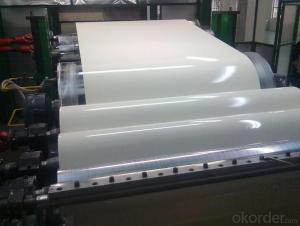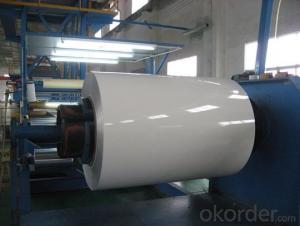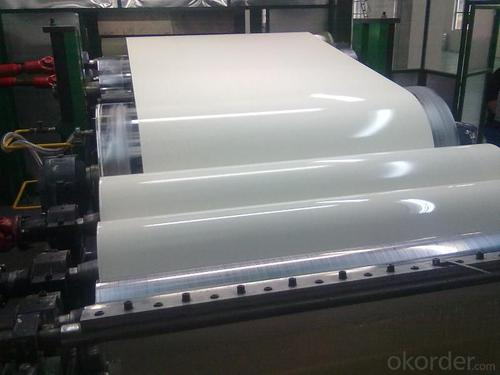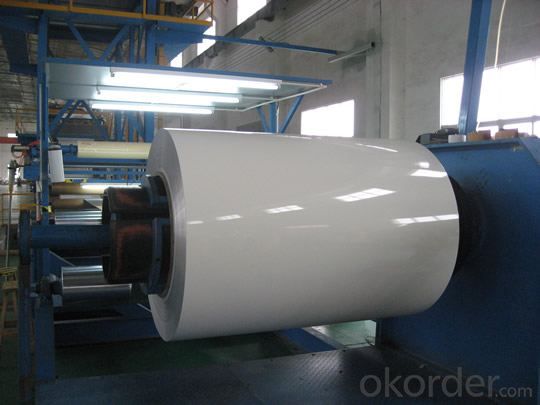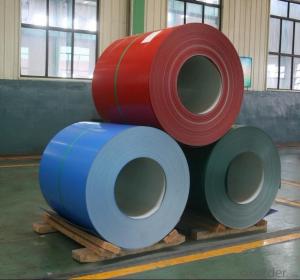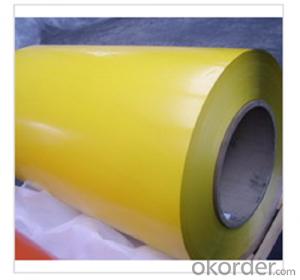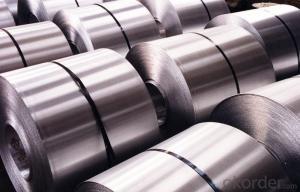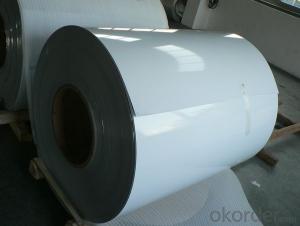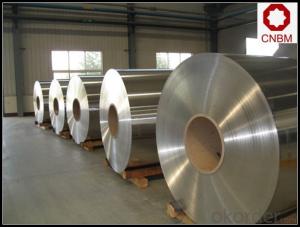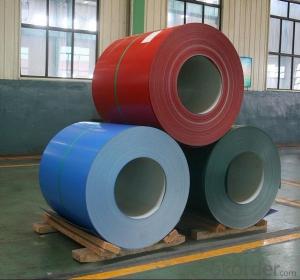Anodized Aluminum Coil Stock for Coated Aluminum Ceiling Panel
- Loading Port:
- Shanghai
- Payment Terms:
- TT OR LC
- Min Order Qty:
- 2 m.t.
- Supply Capability:
- 50000 m.t./month
OKorder Service Pledge
OKorder Financial Service
You Might Also Like
Specification
Coated Aluminium Coil/Roll For Aluminium Ceiling Panel
Description
Alloy | 1060, 1100, 3003, 8011, etc. |
Temper | H16, H18, H24, H26, H28 |
Thickness | From 0.05mm to 3.0mm |
Width | Standard width:1240mm |
Special width:1300mm, 1520mm, 1570mm, 1595mm | |
Diameter | Standard dia:1200mm |
Interior dia:150mm,405mm,505mm | |
Weight | 2.5 T/coil,3.0 T/coil |
Coating | PE, PVDF, ACRYLIC |
Surface | Embossed, mill finish, coated |
Color | AS to code RAL |
Gloss | 10-90%(EN ISO-2813:1994) |
Coating Thickness | PE: more than 18 micron |
PVDF: more than 25 micron | |
Coating Hardness(pencil resistance) | More than 2h |
Coating adhesion | 5J (EN ISO-2409:1994) |
Impact Resistance | No peeling or cracking(50 kg/cm,ASTMD-2794:1993) |
Flexibility(T-bend) | 2T |
MEK resistance | More than 100 |
Advantage | 1.High temperature resistant 2.Weathering resistant 3.Scrubbing resistant 5.Acid or alkali proof 6. Fireproof 7.Light weight material is easy to construct and install |
Out package | Wooden splint with export standard |
Application | ACP, wall cladding, facades, roofs and canopies, ceilings, signboards, blind window, display platforms, electrical panels, etc |
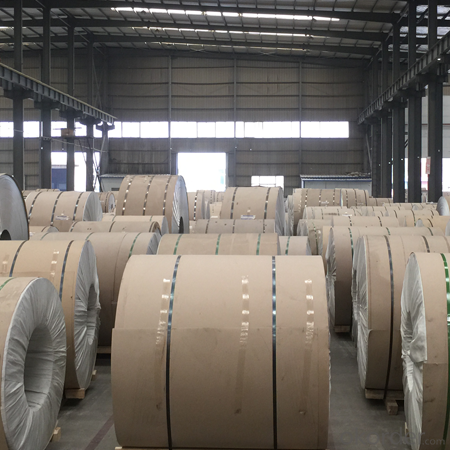
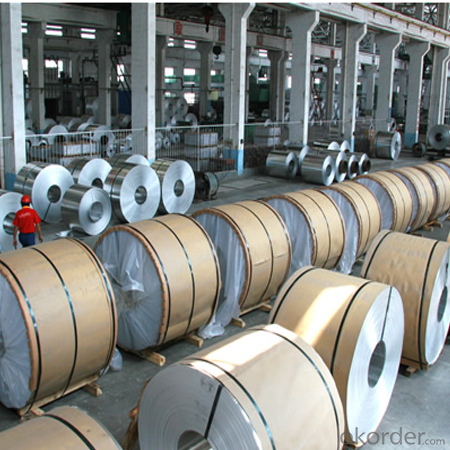
Manufacturing
Decoiler → Accumulator →Tension Leveler →Acid & Alkali Cleaner → Rinse →Conversion Treatment → Priming coater →Infrared Curing Oven →Main coater →Floatation Curing Oven →Strippable Film Applicator → Exit Accumulator → Recoiler
FAQ
--Q: Do you provide free samples?
--A: Yes, free samples will be sent to you on freight at destination.
--Q: Can I get your latest products catalogue?
--A: Yes, it will be sent to you in no time.
--Q: What is the MOQ?
--A: 2 tons
--Q: What are your payment terms?
--A: We accept L/C, T/T.
--Q: What kinds of alloy can you supply?
--A: 1000 series: 1050, 1060, 1070, 1100, 1145, 1200
3000 series: 3003, 3004, 3105, 3104
5000 series: 5052, 5083, 5754, 5182
6000 series: 6061, 6063, 6062, 6063
8000 series: 8011, 8021
--Q: What kinds of temper can you supply?
--A: O-H112: O,H12,H14,H16,H18,H22,H24,H26,H,32,H34,H111,H112
T3, T4, T6
- Q: I don't have a rounded baking tray at the moment and would like to replace it with aluminium foil, do you think it's suitable and that it can withheld the intensity?
- Cheesecake batter is dense. An aluminium tray may not be stiff enough to retain the proposed shape of your cake. Test the pan; load it to the top with water. If it doesn't collapse your cheese cake will not either. You could try using two trays nestled together. You also may need to load the cake and tray on a flat tray when you move it around. Use a thermometer to know when the cake should be pulled. Cook's suggests the top limit at 150 degrees F. Do grease the sides of the pan. Be sure to loosen the cake from the pan side after it is out of the oven. I bake my cakes at 500 degrees F. for ten or twelve minutes, and then to the 150 degree F point at 200 degrees F. Do not open the oven or try to cool it down. Simply dial down the thermostat. If the cake looks too brown cover it with a piece of aluminium foil. Have fun! Avoid cracks...don't overcook the cake!
- Q: Can aluminum coils be used in the production of household appliances?
- Yes, aluminum coils can be used in the production of household appliances. Aluminum is a lightweight and durable material that has excellent thermal conductivity, making it ideal for applications in appliances such as refrigerators, air conditioners, and heat pumps. Aluminum coils are commonly used in the condenser and evaporator coils of these appliances, where they help transfer heat efficiently. Additionally, aluminum coils are resistant to corrosion, which is important for ensuring the longevity and performance of household appliances. Overall, aluminum coils are a popular choice in the production of household appliances due to their properties and benefits.
- Q: What are the standard tolerance levels for aluminum coils?
- The standard tolerance levels for aluminum coils can vary depending on the specific industry and application. However, in general, the tolerance levels for aluminum coils are determined by industry standards and specifications such as ASTM (American Society for Testing and Materials) or ISO (International Organization for Standardization). For thickness, the standard tolerance levels for aluminum coils can range from +/- 0.002 inches to +/- 0.020 inches, depending on the specific grade and thickness of the aluminum. Similarly, for width, the tolerance levels can vary from +/- 0.010 inches to +/- 0.250 inches. In terms of flatness, the standard tolerance levels for aluminum coils are typically specified as a maximum deviation from a flat plane. This can range from as low as 0.001 inches to as high as 0.020 inches, depending on the specific requirements of the application. Other factors that may influence tolerance levels include the surface finish, edge condition, and mechanical properties of the aluminum coils. It is important to consult the relevant industry standards and specifications, as well as the specific requirements of the application, to determine the appropriate tolerance levels for aluminum coils.
- Q: Are aluminum coils suitable for reflective insulation?
- Indeed, reflective insulation can indeed benefit from the use of aluminum coils. With its high reflectivity and low emissivity, aluminum proves to be an excellent material for deflecting radiant heat. By effectively reflecting radiant energy away from the insulated area, aluminum contributes significantly to reducing heat transfer. Unsurprisingly, aluminum coils find widespread application in various reflective insulation solutions, including foil-faced insulation boards and radiant barriers.
- Q: How are aluminum coils tested for thickness and flatness?
- Various methods are employed to test aluminum coils for thickness and flatness, ensuring they meet the necessary specifications. One commonly used method is non-destructive eddy current testing. This involves passing an alternating current through the coil and measuring the changes in the magnetic field caused by the eddy currents induced in the aluminum. By analyzing these changes, the thickness of the coil can be determined. Ultrasonic testing is also utilized to measure the thickness of aluminum coils. This method involves sending ultrasonic waves through the coil and measuring the time it takes for the waves to bounce back. It is highly accurate and capable of identifying any variations in thickness throughout the entire coil. To assess the flatness of aluminum coils, a straight edge or laser beam is often employed. The coil is placed on a flat surface, and the straight edge or laser beam is positioned across its surface. Any deviations from perfect flatness can be easily identified by observing the gaps or irregularities between the coil and the straight edge or laser beam. For a more comprehensive analysis of flatness, advanced technologies like laser profilometry can be used. This involves creating a three-dimensional map of the coil's surface, providing highly detailed information about any variations in flatness across its surface. In conclusion, aluminum coils are subjected to rigorous testing procedures to ensure they meet the necessary standards for thickness and flatness. These tests are essential in maintaining the quality and reliability of aluminum coils, particularly in applications where precision and consistency are crucial.
- Q: Will the surface of the aluminum sheet touch the water?Aluminum rolls weighing 3.463 tons,.35mm thick, 900mm wide, very tight coil, is a mechanical binding. Water does not penetrate the surface of aluminium rolls
- Do you want to ask if the water has seeped into the crevice?If you get it soon, there should be no problem. No, you can just sun it and see if there's any water coming out of it
- Q: What are the different coil coating options for aluminum coils?
- Aluminum coils have several coil coating options available, each with unique benefits and characteristics. 1. Polyester: The most commonly used option for aluminum coils is polyester coil coatings. They are highly durable and resistant to weathering, making them perfect for outdoor use. Polyester coatings also retain color well and come in a wide range of colors and finishes. 2. Polyvinylidene Fluoride (PVDF): PVDF coatings are known for their exceptional performance and durability. They excel in UV resistance, chemical resistance, and extreme weather conditions. PVDF coatings maintain their appearance for a longer time, making them ideal for architectural applications. 3. Polyurethane: Polyurethane coatings offer high resistance to abrasion, chemicals, and corrosion. They adhere well and are flexible, allowing for easy forming and bending of the coated aluminum. Polyurethane coatings are commonly used in industrial applications where durability and protection are vital. 4. Silicone-modified Polyester (SMP): SMP coatings combine the advantages of both polyester and silicone coatings. They resist fading, chalking, and environmental pollutants well. SMP coatings provide good flexibility and adhesion, making them suitable for various applications. 5. Epoxy: Epoxy coatings are known for their excellent adhesion and corrosion resistance. They provide a hard, durable finish that withstands chemicals and abrasion. Epoxy coatings are commonly used in industrial settings with harsh conditions. 6. Plastisol: Plastisol coatings are typically used for textured or decorative finishes. They offer flexibility and impact resistance. Plastisol coatings can be customized with different patterns and textures to enhance the appearance of the coated aluminum. Ultimately, choosing the right coil coating option for aluminum coils depends on specific requirements like desired durability, weather resistance, color retention, and appearance. Consider these factors to select the most suitable coating option for your aluminum coils.
- Q: Can aluminum coils be used in the aerospace industry?
- Yes, aluminum coils can be used in the aerospace industry. Aluminum is widely used in the aerospace industry due to its lightweight, high strength, and good corrosion resistance properties. Aluminum coils are commonly used in various aerospace applications such as aircraft fuselage, wings, engine parts, and structural components.
- Q: This question asks for a brief explanation of the process involved in manufacturing aluminum coils.
- <p>To make aluminum coil, start with high-quality aluminum ingots. These are melted in a furnace and then poured into a casting machine to create a continuous cast strip. This strip is passed through a series of rollers to reduce its thickness and achieve the desired width and thickness. The rollers apply heat and pressure, gradually forming the aluminum into a coil. The coil is then cooled, often using water, and wound onto a mandrel for storage or further processing. Quality control checks are performed throughout the process to ensure the coil meets specific strength, thickness, and surface finish requirements. The final product is a tightly wound aluminum coil ready for use in various industries such as construction, automotive, and packaging.</p>
- Q: How do aluminum coils perform in extreme temperatures?
- Aluminum coils display remarkable performance in extreme temperatures, renowned for their ability to endure high heat without melting or deforming. This is due to aluminum's low melting point of 660°C (1220°F), which sets it apart from other metals. Consequently, aluminum coils are highly sought-after in industries such as automotive, aerospace, and HVAC, where heat resistance is paramount. In addition to excelling in extreme heat, aluminum coils also exhibit exceptional performance in freezing temperatures. This is attributed to aluminum's exceptional thermal conductivity, enabling it to efficiently transfer heat. As a result, even in frigid conditions, aluminum coils can promptly warm up and maintain a consistent temperature. Furthermore, aluminum's resistance to corrosion renders it an ideal choice for outdoor applications exposed to harsh weather conditions. Unlike other materials, aluminum does not rust or deteriorate when exposed to extreme temperatures, ensuring its durability and reliability. In conclusion, aluminum coils are specifically designed to withstand extreme temperatures, making them the preferred option for industries that prioritize heat resistance and long-lasting performance.
Send your message to us
Anodized Aluminum Coil Stock for Coated Aluminum Ceiling Panel
- Loading Port:
- Shanghai
- Payment Terms:
- TT OR LC
- Min Order Qty:
- 2 m.t.
- Supply Capability:
- 50000 m.t./month
OKorder Service Pledge
OKorder Financial Service
Similar products
Hot products
Hot Searches
Related keywords
